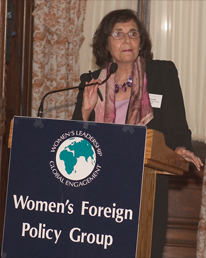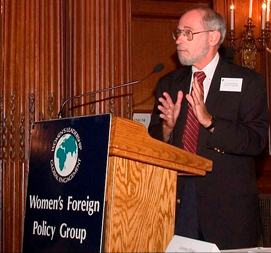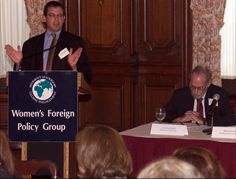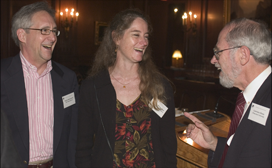Where Western Culture and Muslim Values Intersect: Fact and Fiction
The Cosmos Club | Washington, DC | September 7, 2006
Photos
Lawrence Rosen
2005 Carnegie Corporation Scholar, William Nelson Cromwell
Professor of Anthropology, Princeton University
Brian Edwards
2005 Carnegie Corporation Scholar Professor of English and Comparative Literary Studies, Northwestern University
"If you have even the most basic image of the Middle East, you might want to keep a couple of metaphors in mind. Think of the marketplace where hocking and haggling is rampant, where prices are not fixed, where even in many places, there may be multiple measures. Extend that metaphor to social relationships. Imagine that all of your relationships are negotiable, and that what is expected of you, particularly for a man, to pull together an array of bonds of indebtedness. Picture if you wish, metaphorically, an electrical system that only holds together by pluses and minuses, running in a balance of power. Think of a system, a social and cultural system, in which there is this need to construct bonds of indebtedness that hold society together and how you must constantly engage in this kind of maneuvering, within a world of relationships to construct such a web of indebtedness.
Now imagine a system in which one must constantly forge alliances, but, in which there's a constant expectation of reciprocity and of an interchangeability of obligations. The kind of situation in which nothing is done but there is an expectation that something must be given back. Indeed, if you can finagle it, to indebt the person so that still more has to come back, keep that running imbalance as a relationship. Under those circumstances, you can understand why the veteran will say that a favor comes on a donkey but goes back on a camel. The expectation that more has to be returned keeps the relationship going, and you want always to know other people's sense of indebtedness."
"I'm very curious now, as American culture circulates so rapidly through North Africa and the Middle East, in what individuals, intellectuals, students, young people, make of these cultural forms, and what role that they might have with politics. Attitudes towards American culture, the ways of teaching it, and the university structures are being restructured under their very noses. But they're undergoing similar struggles, similar responses to globalization. Technologies of globalization, especially, satellite television and fax technology, help crack a lot of censorship. The Internet, text messaging on phones, and the creative ways in which these technologies of globalization have been embraced by young people in the region have contributed to the breakdown of a lot of the very facile ideas, the clash of civilizations, and the big radical separation of parts of the world from one another."

WFPG President Patricia Ellis
|

Carnegie Scholar Professor Lawrence Rosen
addressing WFPG audience
|

A WFPG Member during the
question and answer period
|

Carnegie Scholar Professor Brian Edwards
speaking at WFPG Luncheon with
co-speaker Professor Lawrence Rosen
|

A WFPG Member during the
question and answer period
|